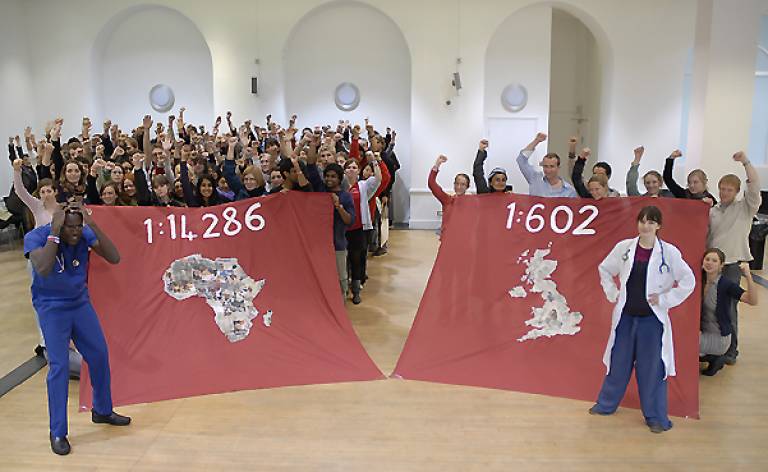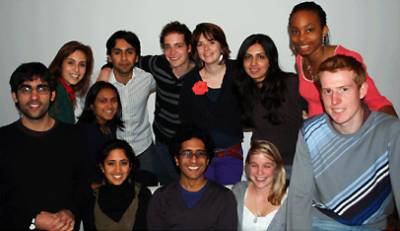Student voice: The Medsin National Conference
4 November 2008
On 25-26 October, Medsin UCL hosted the Medsin National Conference 2008 on the theme of 'Power and Politics in Global Health', supported by the UCL Institute for Global Health and UCL Grand Challenges.
 Medsin is a national network of students concerned with issues in global health, and its annual conference is one of the largest student-led conferences in the UK. The organising team from Medsin UCL explain what happened and why.
Medsin is a national network of students concerned with issues in global health, and its annual conference is one of the largest student-led conferences in the UK. The organising team from Medsin UCL explain what happened and why.
Rudolf Virchow, one of the fathers of public health, said, "Public health is a social science and politics is public health in its most profound sense." Yet little research has gone into understanding how political and economic forces shape the health of populations. The focus of the Medsin National Conference was to look at the dynamics of these political and economic forces and explore the powerful effects they have on health.
The conference took place against the backdrop of the most politically charged period in recent history. With the highly politicised Olympics in China this past summer, the potentially groundbreaking US elections, and a global economic crisis that is likely to reshape the institutions that govern our world, the powers and politics of today are clearly shifting, and global health will feel this change.
Actions speak louder than words
The conference posed the questions: how is power reproduced in society, both nationally and internationally? How does this power affect the health and wellbeing of populations? What is the effect of wealth and income distributions on population health? Why do some countries have national health insurance, others have national health services, and the US has neither? What are the influences of financial and corporate capital in the health sector? What does democracy mean in this context and how does it relate to health?
Medsin's campaign action, illustrating the disproportionate doctor:patient ratio in developing countries
Through four plenary sessions and over 80 workshops, more than 450 delegates from the UK and beyond explored these questions and many more associated with global health inequity. Among the 19 internationally acclaimed speakers were Martin Wolf (Chief Economics Commentator, 'Financial Times'), Clare Short MP, Dr Richard Horton (Editor, 'The Lancet'), Elizabeth Pisani (Journalist and Author, 'The Wisdom of Whores') and Prof Nancy Scheper-Hughes (UC Berkeley), as well as UCL's own Prof Jonathan Wolff (UCL Philosophy) and Dr Roberto De Vogli (UCL Epidemiology and Public Health). The discussions ranged from a heated debate on the role of the market in improving health, to challenging the roles of civil society and religion in setting the global health agenda.
Medsin is not only concerned with educating students about the wider social context of health, but also seeks to motivate them to engage with the democratic process to empower the disenfranchised. Accordingly, several campaign actions took place over the course of the weekend, with the main action focusing on health systems. Delegates grouped together to illustrate visually the disproportionate levels of health care workers in the developed world compared with the developing world - a consequence of numerous factors that mitigate against investment into publicly-run and well-resourced health systems.
Year-round commitment
Global health inequality is one of the most demanding issues of our age. HIV/AIDS ravages southern Africa, whilst in Europe it is a managed chronic disease. Malaria has been eradicated from most of southern Europe, yet it is still one of the biggest killers of children under the age of five in many tropical areas. In 2008, food production reached an all time high, yet famines and food shortages raged across the world.
Medsin UCL is actively involved in tackling these issues. We have a high profile for global health advocacy and run campaigns on many different issues. This year we have taken up two new campaigns: Universities Allied for Essential Medicines, which has been launched in conjunction with the UCL Law Student Human Rights Programme; and Healthy Planet, which focuses on the impact of climate change on health. We also run hugely successful community projects that range from teaching sex education in inner city secondary schools, to volunteering programmes as far afield as Ghana.

Medsin UCL is not just an isolated society - we are the heart of student global health at UCL. We are dedicated to bringing together students from all faculties and departments, as they all have a role to play in global health. At UCL, Medsin is at the forefront of student action on global health, creating a space for student engagement in this field. Building on last year's successful series of lectures and debates, Medsin UCL will be hosting a number of fortnightly events this academic year as part of the university's global health series. We have also launched our own magazine 'Perspectives', written and produced by students from the UCL community.
Dr Julio Frenk, Dean of the Harvard School for Public Health, said in a foreword to the annual conference: "More today than ever, health represents a common ground, a source of shared security, a way to give globalization a human face. It is there, in our ability to care for each other, in our determination not to leave anybody behind, in our vision of health as a human right, where we may find the building blocks for a better world. This is the spirit that should underpin global health in the 21st century. I am confident that committed student organizations like Medsin will lead the global cause of justice through health".
Majdi Osman and Natalie Gulliver (Medsin National Conference 2008 Organisers); Mustafa Abbas and Davina Kaur Patel (Medsin UCL Co-Presidents 2008/2009), pictured above with other members of the Medsin conference team
|
Interested in joining Medsin UCL? Find out more at the Medsin website, where you can read 'Perspectives', or email us on medsin.ucl@gmail.com Look out for the next issue of 'Perspectives' in December 2008. |
 Close
Close

